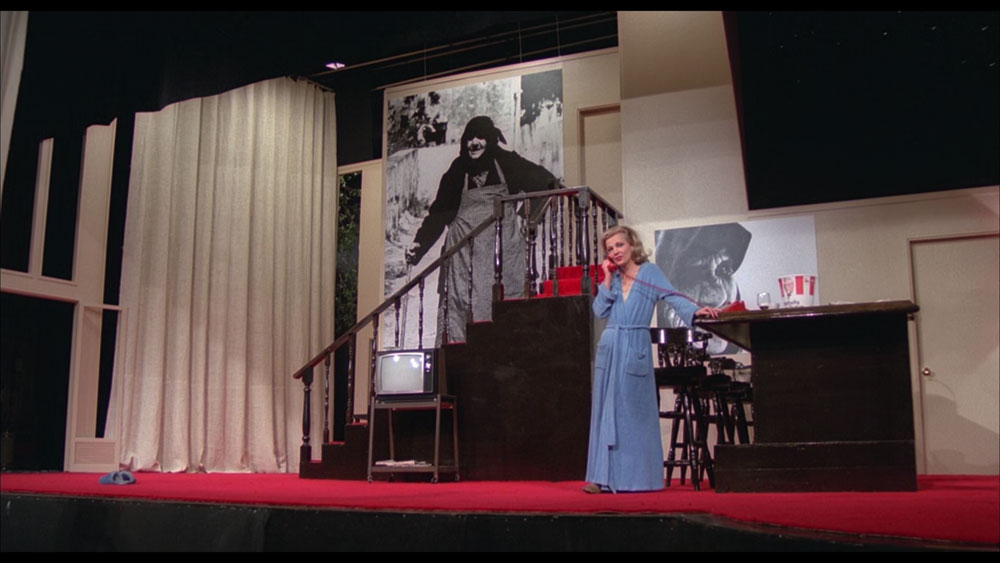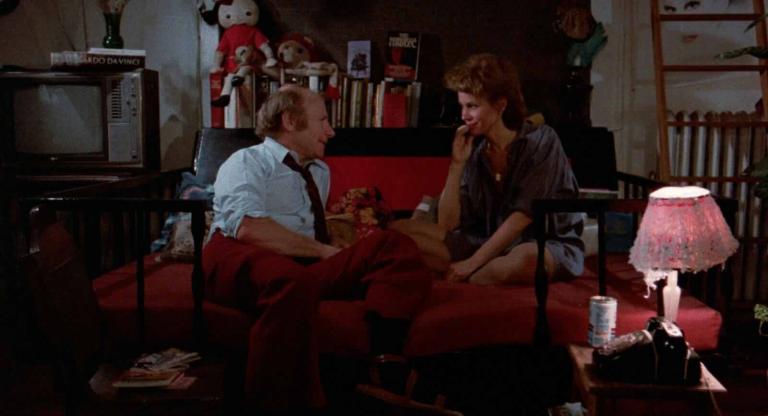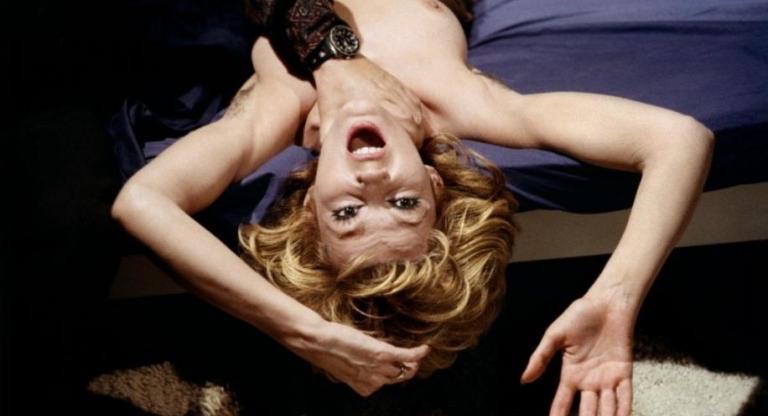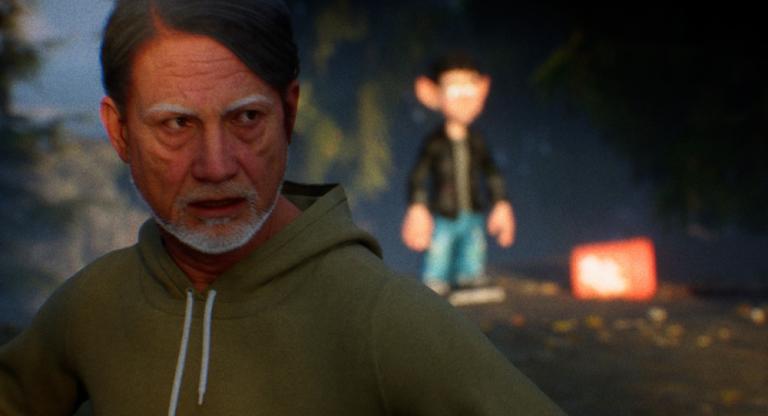“Put [Opening Night] and A Woman Under the Influence side by side and you have ample proof of my theory that Gena Rowlands is the greatest American actor or actress ever,” wrote Michael Imperioli for his Criterion top-ten list. In those collaborations with John Cassavetes—along with Minnie and Moskowitz (1971), Gloria (1980), and Love Streams (1984)—Rowlands is raw and vulnerable. Without any identifiable technique, she expressively peels away the many layers of the women she portrays, women who may be under the influence and are usually close to being out of control, but completely riveting at all times. Her acting is a marvel and it meshes perfectly with Cassavetes’s quest to achieve heightened artistic moments that reveal the most intimate of emotions by breaking down the boundaries between fiction and reality, theatricality and naturalism, and spontaneity and structure.
None of the Rowlands-Cassavetes films together so directly address the subject of her craft as Opening Night (1977). Rowlands plays Myrtle Gordon, a stage actress in her late forties who is conflicted about playing an older woman approaching menopause in a Broadway production of a play called A Second Woman. Filmed between her Oscar-nominated turns in the maverick independent hit A Woman Under the Influence (1974) and the Hollywood studio release Gloria (1980), Opening Night is a spectacular showcase for Rowlands who stars in a bravura self-reflexive performance. And yet, Rowlands did not receive an Oscar nomination for Opening Night; hence, the film’s inclusion in the Museum of the Moving Image’s ambitious series dedicated to historic Oscar-snubbed performances.
Surprisingly—considering that the film is now an established classic—Opening Night never had a chance to be nominated because it barely played in theaters upon release. It wasn’t publicly shown in New York until 1980, when it was screened at the Museum of Modern Art as part of a Cassavetes retrospective. In 1977, the film opened in the United States at a couple of lone theaters in Los Angeles, Portland, and Washington D.C. Cassavetes was a completely independent filmmaker, not only self-financing his productions, but also self-distributing in addition to paying for marketing and exhibition costs out of pocket. Although he made millions on the surprise box-office success of A Woman Under the Influence, his next film, The Killing of a Chinese Bookie (1976), was a critical and box office disaster. The failure of the movie made Opening Night virtually unbookable. In New York, the promotional expenses would have been too high and theaters did not want to show it. After its MoMA screening, the film didn’t reappear in the city until a showing at the New York Film Festival in 1988, and it didn’t have a New York theatrical release until 1991, two years after Cassavetes died.
Even if Opening Night had a substantial theatrical release, it still may not have received an Oscar nomination. To its great credit, it is a strange, complicated, unsentimental, and inchoate film—a movie that dares losing control about a play that is clearly out of control. Cassavetes’s follow-up to Chinese Bookie is a true Chinese puzzle box featuring overlapping narratives, shifts in tone, and a confounding slapdash visual style. Over the course of the film, we see fragments from A Second Woman, which feels like an awkward Cassavetes film teetering between sitcom and melodrama. Cassavetes plays Maurice Aarons, an actor and former lover of Myrtle’s. While Maurice and Myrtle are ex-lovers in real-life, in the play-within-the-film they act as Virginia and Marty, a married couple. At any given moment when Rowlands and Cassavetes are on stage it becomes unclear whether the woman on the screen is Virginia, Myrtle, or Rowlands. It is equally unclear whether the emotional outbursts and playful improvisations taking place in the film are done in or out of character. Adding to the confusion is the fact that the play-within-the-film was staged before a real audience whose responses to what they were watching was unscripted. And, there is a ghost-story element wherein Myrtle is haunted by an adoring young fan and would-be actress—à la All About Eve (1950)—who she saw struck by a car and killed during a rainstorm after one of her performances.
Myrtle’s anxiety about aging is the film’s MacGuffin. Her real concern revolves around how to truly bring her character to life. The film is not just about how to act on the stage, but how to live authentically. The playwright behind The Second Woman in the film (wonderfully played by Joan Blondell) tells Myrtle that her job is simply, “to say the lines clearly, and with a degree of feeling.” But that isn’t enough for Myrtle. She needs to find the truth within her character and her inability to do so causes her to lose her grip on reality. Both Opening Night and its production of A Second Woman thrillingly feel beyond the control of its makers. But Rowlands holds the enterprise together with her performance, in which she is able to embody different versions of herself in response to the film’s shifting tonal registers. When Myrtle takes a bow and receives a rapturous applause from the theater audience near the end of the film, the brief joy she enacts feels entirely authentic. In that moment, Myrtle disappears and we witness Rowlands in a state of triumph upon having delivered one of her greatest performances.
Opening Night’s stature has steadily grown in the years since its release. In 2019, New York saw two fascinating stage productions inspired by the film. In BAM’s 24-hour A Second Woman, a scene from the film’s play was performed over and over again with the same actress, but with 100 different actors pulled from a mix of professionals and volunteers. At FIAF, Isabelle Adjani starred as Myrtle Gordon in a more conventional stage adaptation of Opening Night. The Belgian theater director Ivo van Hove also staged an adaptation of Opening Night at BAM in 2008. And, it should come as no surprise that next month a musical version of Opening Night directed by Hove, with music and lyrics by Rufus Wainwright, opens on the West End in London.
Opening Night screens tonight, February 9, and tomorrow afternoon, February 10, at the Museum of the Moving Image as part of the series “Snubbed 2: The Performances.”



